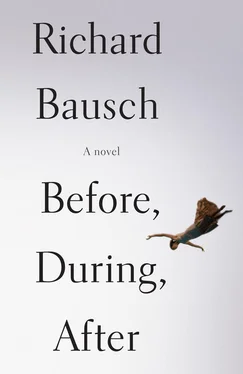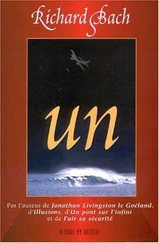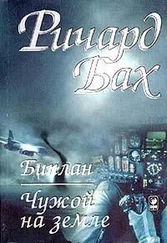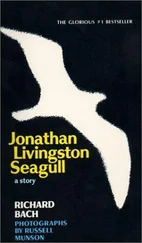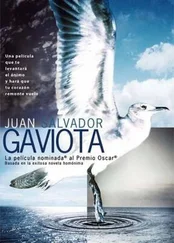As the first tower began to collapse, another cry went up among the people in the lobby, and the young newscaster’s voice carried above it. “I believe there’s been some kind of further explosion. Are you seeing this?”
No one spoke. The crowd gathered in a tighter circle around the screen, another news voice talking about the Pentagon in Washington, D.C., and still the cameras in New York showed the churning ash and smoke, the street-level cameras capturing the panic, people running, the yellowish-brown dust covering everything.
“The whole of southern Manhattan’s coated with this dust now,” said a male voice on the TV.
And Natasha turned to Constance. “Michael’s there . He was talking about going to the top of — he said he was — he was going up to the top of — he was—”
The other woman stared, beginning to comprehend.
Natasha, gasping for breath, felt all the strength go out of her legs. Constance gripped her by the arms. “We don’t know anything definite,” she said. “We don’t know anything. He’s probably not anywhere near it. Natasha, listen to me.”
Crying, Natasha said, “I think he — I can’t — no. No.”
“He’s probably still asleep in the hotel. There’s always a long line down there. And — and listen. I was there a couple of years ago, and I don’t think you can get up to the observation deck until something like ten o’clock. Now, really, honey. I remember that.”
They were both quiet a moment, and they saw the second tower collapse.
“Oh my God,” Constance said. “Those poor people. Those poor, poor people.”
“I have to get home,” Natasha told her, beginning to cry. “Oh, I have to go home. I want to go home.”
3
Faulk rose from the bed and finished dressing, and as he was tying his shoes the phone rang. He thought it might be the hotel desk.
It was Aunt Clara. “You all right?”
“Hey,” he said.
“Where are you?”
“My hotel room.”
“Look out the window.”
“I was just doing that.”
“And you’re all right.”
“Clara?”
“Turn the TV on.”
He reached behind him on the bed to get the remote. “What is it?”
“They’ve hit the World Trade Center.”
The television came to light, and there were the towers, burning. He looked back out the window and saw the spotless sky. “ Who hit them.”
“Planes. Extremists. Airliners. Some body.”
“Airliners?” he said. Then: “Airliners.”
“Where are you?” Clara said.
“Fifty-Fourth Street.”
“You tried calling Natasha?”
“They’ll be out at the beach.”
“Gotta try leaving a message for her.”
“My God,” Faulk said, watching the clip of the second plane hitting.
“They’re saying another one hit the Pentagon.”
He stared at the bloom of fire in the side of tower one being played over and over — the second plane. For a few moments, Aunt Clara just breathed into the phone, and he listened. “Are you okay?” he said.
“I’m all right. But oh, God, how many people—”
“These were passenger planes?”
“Are you looking at it? Planes. Yes.”
As the first tower went down, the newswoman began breathlessly repeating the word incredulous . Faulk, watching it happen, said to Clara, “The building’s collapsing.”
Silence.
“Clara?”
When he understood that the line was dead, he tried once more. Nothing. And no answer at the front desk, either. Hurriedly, he packed his bag and then realized there was nowhere to go. He made another attempt to call Clara, with no success. He tried long distance to Jamaica, got the ring, but the phone simply went on ringing. Sitting at the end of the bed, he waited. No answer. He put the receiver back in its place and then picked it up and punched the number again. Nothing.
There wasn’t anything else to do but watch. He saw the second tower collapse. He tried to pray. At last he made still another attempt to phone Jamaica. Now there was no signal at all. He hung up, and almost immediately it rang. It was his father. “You’re okay,” the old man said almost as though trying to reassure him. “I just talked to Clara.”
“I’m way up on Fifty-Fourth Street. I lost her. The line went dead.”
“That’s what she said. You believe this shit?”
“No.”
“I’d better call her back. She thinks the building you’re in might’ve collapsed because the connection got broken and you were talking about the building collapsing. She was pretty upset. And I told her there wasn’t anything about buildings collapsing uptown. But she couldn’t get through.”
“Tell her I’m okay.”
“When’re you getting out of there?”
“I don’t know yet. Today for sure now if I can. I want to see if I can get hold of Theo.”
“Get on out of there, Son. You don’t know what else they might be planning.”
“I’ll let you know,” Faulk told him.
“I’m gonna tell Clara you’ll be in later today.”
“Yes, do.”
After he hung up, he tried to open the line, but it was dead again. He pushed the buttons down, and there was a dial tone. But nothing happened — nothing interrupted the dial tone.
Downstairs, the lobby was crowded and quiet. People were checking out and checking in as usual. He waited in line with his bag. No one appeared willing to look at anyone else. It was very quiet. He went out to Fifty-Fourth Street. There was a subdued something even in the normal traffic sounds. The sunny sky was unchanged. When he got over to Fifth Avenue, he heard the sirens, and looking south he saw the massive ash-colored cloud. The cloud was bizarrely contained, one spiral-shaped strand extending out from it to great height. He saw clear pale sky above it all.
He started down the avenue. Trinity Church, the planned site of the wedding ceremony, was in the vicinity of the World Trade Center. Yesterday, he had seen the towers from the window as the train neared the city, and seeing the two structures looming above everything, gleaming with reflected sunlight, he thought of being inside, high up, looking out.
Remembering this made him momentarily short of breath. He went to the curb, intending to flag down a cab. But none of the cabs were stopping. Most of them were coming from the opposite direction.
It occurred to him then that he was in fact headed to where the calamity was taking place. There would be no wedding today. He stopped. The entire morning remained. He had been wandering south. His headache had returned; his mouth was dry. The street now seemed nearly deserted. He saw some people sitting in a sandwich shop with a phone booth at the back. No one seemed to notice him. They were all talking quietly, huddled together, or simply staring with dread out at the sunlight and the buildings opposite. A woman sat crying while two others attempted to calm her.
In the phone booth he was absurdly elated to find that there was a dial tone and that the phone was working when he touched the numbers. He called the downtown Marriott, and to his surprise someone picked up, a woman, who sounded hurried but nothing like someone in the grip of panic. He asked for Theo Ruhm, and she immediately clicked off. He heard a buzzing, and Ruhm answered. “Hello.” It was nearly a shout.
Faulk said, “This is Michael.”
“It’s awful,” Theo Ruhm moaned. “Total confusion. Nobody can get ahold of anybody. But the wedding’s off. They’re setting up to do triage at the church. Triage , for Christ’s sake. Oh, God — I saw it. I went over there and saw everything. It’s awful. We’re headed out. Back to the house. Can you get here?”
“I’m almost to Penn Station,” Faulk said. “I’m going down to D.C.”
Читать дальше
